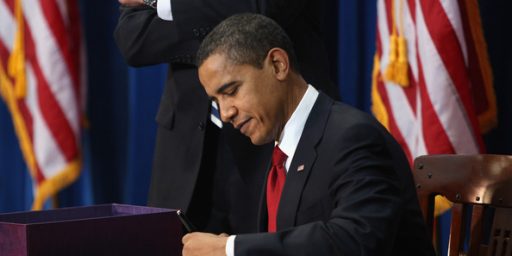Government Created Jobs Worth the Cost?
 Paul Krugman argues that President Obama’s critics are misrepresenting his so-called “economic stimulus” plan. For example:
Paul Krugman argues that President Obama’s critics are misrepresenting his so-called “economic stimulus” plan. For example:
[T]here’s the bogus talking point that the Obama plan will cost $275,000 per job created. Why is it bogus? Because it involves taking the cost of a plan that will extend over several years, creating millions of jobs each year, and dividing it by the jobs created in just one of those years.
It’s as if an opponent of the school lunch program were to take an estimate of the cost of that program over the next five years, then divide it by the number of lunches provided in just one of those years, and assert that the program was hugely wasteful, because it cost $13 per lunch. The actual cost of a free school lunch, by the way, is $2.57.
The true cost per job of the Obama plan will probably be closer to $100,000 than $275,000 — and the net cost will be as little as $60,000 once you take into account the fact that a stronger economy means higher tax receipts.
The comparison doesn’t hold up. A school lunch is a consumable; once it’s eaten, another unit is required. A job, on the other hand, is an amorphous entity. If it costs $275,000 over 5 years to create a single job, there’s no way to know what the divisor is. The job isn’t created until it’s created — meaning the alleged stimulus doesn’t happen in the early years — so the jobs created in the out years don’t count as five units and the jobs created in the early years may or may not continue beyond the first year or two.
Regardless, let’s assume Krugman is right and that on average the cost of creating a job is $100,000. That’s a lot of money. Rather few jobs as a percentage, after all, actually pay $100,000 a year. Even at $60,000 — under the rather odd assumption that spending $100,000 to create a job the economy wasn’t otherwise demanding will create $40,000 a year in economic expansion — it’s a lot of money; outside of a handful of expensive metropolitan areas, $60,000 is an upper middle class salary.
Image by Flickr user lumaxart used under Creative Commons license.






A big part of why crime, especially violent crime, has been down the last ten or fifteen years is because the economy has been doing well and there are jobs to be had. Every day thousands of jobs across the country are being done away with, and that leaves people with a little less hope. If people stop working, they lose hope and crime goes up. There are more than just financial factors at play here.
While I’m sympathetic to arguments about the timing of the stimulus results, I’m not sure how much weight to give to the “cost per job” number. Aren’t we also getting things done, like infrastructure improvements?
If the sole purpose of the proposal was to create jobs, then yeah that number would be important, because we could alternately just send out a check for the given amount to the same number of people. The difference is that nothing would get done, and the “job” wouldn’t be permanent. In other words, you also have to take into account how long the job might last. If it’s costing $275,000 per job, but the job lasts 5 years, then we’re really comparing it to a $55K/year job (or is this what Krugman is saying?).
Of course, the job isn’t the only thing the taxpayers get for their net $60k outlay. In fact the job is actually just a byproduct of the bridge built, pothole filled, windmill erected, school built, and etc. If part of the stimulus goes to hiring teachers, the benefit is not just more teaching jobs: it’s also smaller class sizes with all the benefits that brings in terms of student performance, reduced drop out rates, reduced crime…
Implying that the job is the only thing the taxpayer is getting for their net $60k is more than a little misleading.
Sure. But that’s just as true if we used it to buy new aircraft carriers or provide tax cuts that people turned into refrigerators, TVs, and sofas. These programs are sold as job creation and economic stimulus, so it’s not unreasonable to judge them on that basis.
I suppose increased military spending could be an effective short term stimulus. Though over the long term the same money spent on, say, the domestic rail system would have greater economic benefit, by lowering the cost of bringing goods to market and reducing energy use.
But it’s demonstrably false that tax cuts would be as effective a stimulus as government spending: most of the recent tax rebates were saved rather than spent. And if “stimulus” tax cuts are enacted not as rebates but, as McCain and others in the GOP are arguing, as permanent cuts, you wind up with a permanent enlargement of the deficit and no new infrastructure to show for it.
I had an idea the other day, that if the stimulus needs to include tax cuts for political purposes if nothing else: instead of issuing checks which in the current scary times people are likely to save rather than spend, defeating the purpose of short term stimulation….why not issue debit cards that can only be redeemed for goods or services? The system is already in place; in the past few months I’ve gotten at least 3 such cards as rebates for buying software and signing up for new phone service. The card issuance could be contracted to private companies that already do this, and the cards redeemed by any business that accepts Visa or Mastercard. The cards could be restricted to redemption only at US locations, hindering transfer of the rebate out of the US.
I’m sure there’s something seriously wrong with this idea, but haven’t thought of it yet.
But James, where do these ref’s, tv’s and sofa’s come from? Have you tried of late to buy an american made product? (it is still possible but it get’s harder and harder all the time) If you want to help the american economy, you have to actually put americans back to work.
I know this grates on the “tax-cut first” crowd, but I ask again, think about it… Otherwise we have just another “Chinese Economic Recovery Act”.